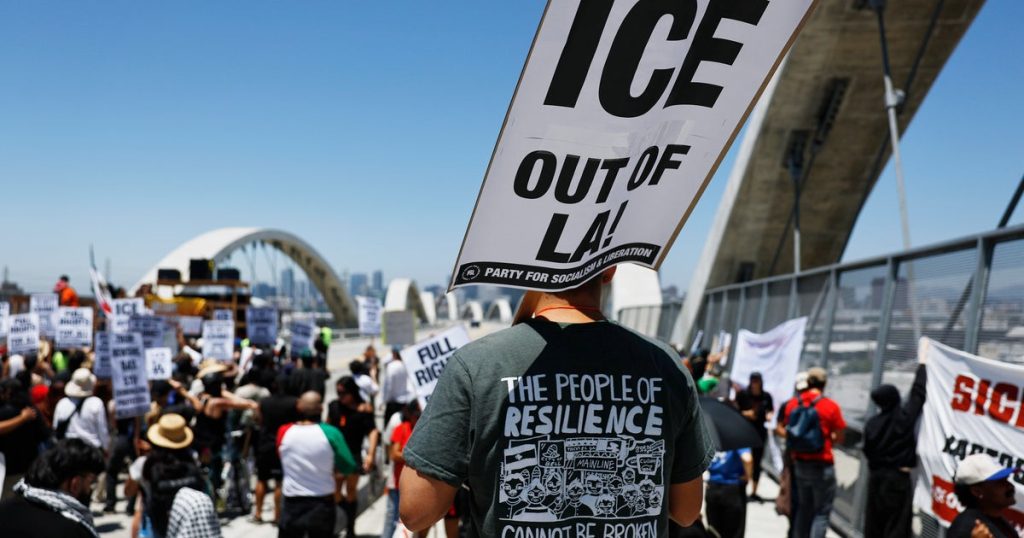In a landmark ruling on Friday, a federal judge has temporarily halted immigration raids across Los Angeles and several California counties, responding to a lawsuit filed by the American Civil Liberties Union (ACLU). U.S. District Judge Maame Ewusi-Mensah Frimpong determined that federal agents must have reasonable suspicion before conducting detentive stops, emphasizing the need to protect constitutional rights. The ruling also addresses accusations of racial profiling and violations of due process linked to immigration enforcement tactics utilized under the previous administration.
| Article Subheadings |
|---|
| 1) Overview of the Court’s Ruling |
| 2) The Role of the ACLU and Other Plaintiffs |
| 3) Implications for Immigration Policy |
| 4) Reactions from Officials and Community Leaders |
| 5) Economic Impact on Local Communities |
Overview of the Court’s Ruling
Judge Frimpong’s ruling, which came about after a lawsuit filed by the ACLU, places significant restrictions on the ability of federal agents to conduct immigration stops. The judge emphasized that law enforcement must operate within the boundaries of the Fourth Amendment, which protects against unreasonable searches and seizures. Specifically, the ruling stipulates that immigration agents cannot rely on characteristics such as race, ethnicity, or language—such as speaking Spanish—to justify stops. This decision reinforces constitutional safeguards and aims to prevent abuses commonly associated with immigration enforcement.
The Role of the ACLU and Other Plaintiffs
The ACLU, along with immigrant rights groups and various local governments, filed the lawsuit to challenge the Trump administration’s practices. They alleged that these practices were discriminatory and violated both the immigrants’ and citizens’ constitutional rights. Notably, the ACLU’s attorney, Mohammad Tajsar, voiced concerns over unlawful stops based solely on physical appearance or language. The coalition of plaintiffs included cities such as Montebello, Culver City, and Pasadena, highlighting a widespread discontent regarding federal immigration enforcement’s handling amidst a backdrop of heightened tension in immigrant communities.
Implications for Immigration Policy
Frimpong’s ruling could signal a monumental shift in immigration policy enforcement. By requiring reasonable suspicion and access to legal counsel for detained individuals, the court is advocating for accountability within federal immigration operations. This ruling could set a precedent for future cases, influencing how immigration laws are enforced across the nation and potentially altering the legal landscape for the treatment of immigrants. Legal discussions about the balance between immigration enforcement and constitutional rights are becoming increasingly relevant, especially as similar lawsuits arise in other jurisdictions.
Reactions from Officials and Community Leaders
Reactions to the ruling have varied significantly among officials and community leaders. California Governor Gavin Newsom welcomed the decision, stating that it represented a victory against racial profiling and a protector of civil liberties. In contrast, U.S. Attorney Bill Essayli expressed strong disagreement with the court’s ruling, emphasizing that federal agencies would continue their work while adhering to the Constitution. This divide reflects broader national conversations regarding the effectiveness and morality of current immigration policies.
Economic Impact on Local Communities
The ACLU’s lawsuit also highlighted the economic burdens associated with heightened immigration enforcement in local communities. Since the operations ramped up, cities reported significant financial strains, including increased costs for law enforcement and the loss of potential tax revenue. Los Angeles County alone accumulated an estimated $9 million in additional expenditures. Local officials noted that these costs could be likened to the adverse economic effects felt during the COVID-19 pandemic, creating a compelling argument that inefficient and aggressive immigration policies have far-reaching consequences.
| No. | Key Points |
|---|---|
| 1 | Federal judge halts immigration raids in California due to unconstitutional practices. |
| 2 | The ruling mandates reasonable suspicion for detentive stops. |
| 3 | The ACLU claims systemic discrimination against immigrants. |
| 4 | Reactions from state officials showcase a divided perspective on immigration enforcement. |
| 5 | Immigration enforcement actions impose significant financial strains on local governments. |
Summary
The ruling by Judge Frimpong represents a critical juncture in the ongoing debate concerning immigration enforcement and constitutional rights. By placing restrictions on detentive stops without reasonable suspicion, this legal decision seeks to protect the civil liberties of all individuals within California. As local governments align themselves with organizations like the ACLU, the future of immigration policy continues to evolve in response to community demands and constitutional safeguards.
Frequently Asked Questions
Question: What led to the federal judge’s ruling regarding immigration raids?
The ruling was prompted by a lawsuit from the ACLU and other immigrant rights groups, which claimed that the Trump administration’s immigration enforcement practices were unconstitutional and discriminatory.
Question: How does the ruling impact federal immigration enforcement?
The ruling mandates that federal agents must have reasonable suspicion before conducting immigration stops, thereby restricting the type of profiling that has historically been used in such operations.
Question: What are the economic implications of heightened immigration enforcement in local communities?
Local governments have reported significant financial burdens due to increased law enforcement costs and lost tax revenues. These pressures mirror the economic impact experienced during public health crises like COVID-19.


